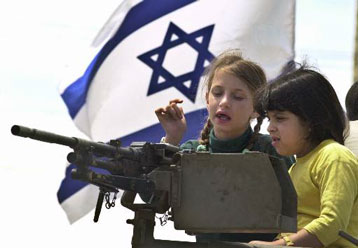



Fear and rage infect children's lives
by Cheryl Bowlan
and Donna Hemmila
 |
| Israeli girls look at an Israeli army tank's gun during Independence Day events in a southern West Bank Jewish settlement, near Hebron, April 26, 2001. (AP photo) |
The Palestinian-Israeli conflict is building a legacy of childhood trauma that cuts deeper than the wounds left by young suicide bombers.
Relief workers, psychologists and parents themselves are seeing emotional
injuries festering in the children who are growing up surrounded by the
horrors of this decades old battle.
"War causes incredible long-term, continuing trauma not only for
children but also for their caregivers," says Casi Kushel, family
therapist and consultant to the Jewish Youth and Family Services, Immigration
and Refugee Project.
Children living through the violence of war will enter adulthood with
almost no experience in feeling secure, she says, and that is a deficit
they will pass on to their own children.
As the violence escalates, those who work with children fear the trauma
will only continue to feed the cycles of hatred in the Middle East.
Since August 2001, according to the Israeli Ministry of Foreign Affairs,
13 Palestinians under the age of 18 have been involved in suicide attacks.
From October 2001 to May 2002, according to the Israeli Information Center
for Human Rights in the Occupied Territories, 51 Israelis under the age
of 18 were killed, 39 from suicide attacks. In that same period, 220 Palestinian
children lost their lives, eight of them from delays in medical treatment
the center attributes to Israeli soldiers restricting movement into the
areas where they were injured.
Ahmed Zayed, a father in Ramallah, says his 9-year-old son, Alyyan, cried
for more than two hours when troops entered his neighborhood on April
3 and the boy saw two tanks a few feet from the front door. Zayed tried
to calm the boy by telling him that the soldiers wouldn't hurt children,
but Alyyan countered by rattling off the names of 10 children who have
lost their lives since the beginning of the Intifada. He accused his parents
of telling untruths and refused to sleep alone.
 |
| Palestinian boy crawls through rubble in Jenin refugee camp after erecting the Palestinian flag, April 17, 2002. (AP photo) |
"He woke up several times shouting and crying, where I have to calm
him down and put him back to sleep," Zayed says. "I am really
so worried about the aftermath of this situation since the city has no
children psychological treatment centers."
Children in war often show trauma symptoms such as fear, anxiety and
chronic bed wetting, says Justine McCabe, a Connecticut cultural anthropologist
and clinical psychologist.
"The numbers of people with post-traumatic stress disorder going
around Israel and the Palestinian territories are enormous," says
McCabe, who has volunteered at the Gaza Community Mental Health Program
in Gaza City.
She believes human beings need to develop a non-suffering part of themselves
to accept the suffering parts. For Palestinian children, the non-suffering
capacity has been greatly reduced and the suffering has become too much
to hold, says McCabe.
"For Palestinian children, there's unbelievable rage with no outlets,"
says McCabe. "It's an oppressive kind of experience with no power."
Iman Ajah, a Palestinian living in San Bruno, Calif., says her sister
has difficulty calming her daughter who wakes up crying in the night.
"When I talk to my niece on the phone she says 'what's the difference
between me and the Jewish kids who are playing and I'm trapped in the
house with no food, no toys -- nothing? What's wrong with me? Is it fair?'
"
Psychologists are showing growing interest in studying children who mature
during war. The violence to Palestinian children 10 years ago during the
first Intifada uprising created a formula for the perpetuation of war,
says McCabe.
Attempts to crush Palestinian resistance have ensured a continuation
of hostility, she says, and a deepening hatred of Israelis.
Family therapist Kushel says there was a time when the experiences of
Israeli and Palestinian children were enormously different. With the wave
of violence both are living under now, their experiences are moving closer
together. Israeli children were raised in an atmosphere where they felt
safe. Now the smallest tasks like getting on a bus or going to school
are terrifying experiences that could end in explosion and death.
Social scientists don't yet have enough evidence to predict what will
happen to this generation of children, but Kushel says, based on the experiences
of children in other wars there is not much for which to feel optimistic.
"War is not good for anyone -- not for the aggressor, not for the victim, not for anyone involved," she says.
